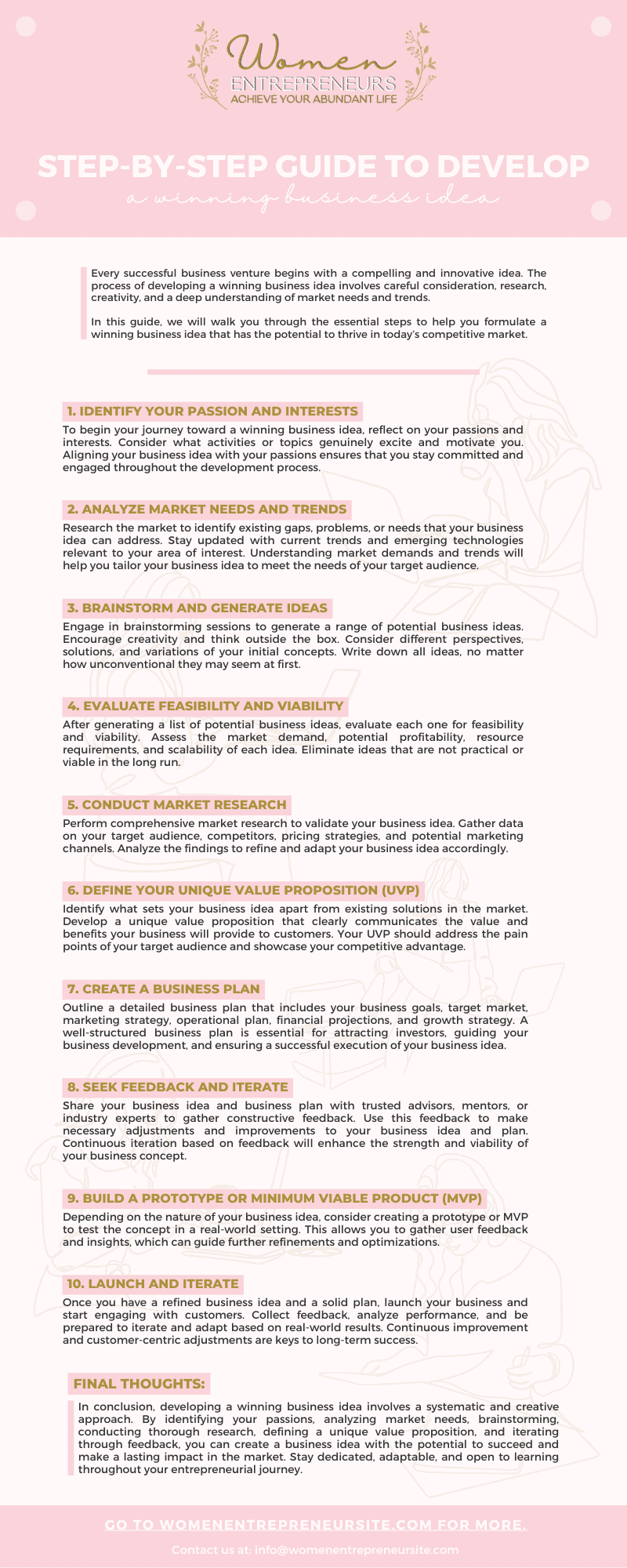In the realm of professional growth, there comes a pivotal moment for many individuals when the…
Step-by-Step Guide to Develop a Winning Business Idea

Every successful business venture begins with a compelling and innovative idea. The process of developing a winning business idea involves careful consideration, research, creativity, and a deep understanding of market needs and trends.
In this guide, we will walk you through the essential steps to help you formulate a winning business idea that has the potential to thrive in today’s competitive market.
How to Talk to Anyone
What is the elusive quality that endears certain individuals to others, garnering instant love and respect? Everyone aspires to befriend them or, for those unattached, become their partner. In the business realm, they ascend rapidly up the corporate hierarchy. Ultimately, it hinges on a more adept approach to interpersonal interactions.
1. Identify Your Passion and Interests
To begin your journey toward a winning business idea, reflect on your passions and interests. Consider what activities or topics genuinely excite and motivate you. Aligning your business idea with your passions ensures that you stay committed and engaged throughout the development process.
2. Analyze Market Needs and Trends
Research the market to identify existing gaps, problems, or needs that your business idea can address. Stay updated with current trends and emerging technologies relevant to your area of interest. Understanding market demands and trends will help you tailor your business idea to meet the needs of your target audience.
3. Brainstorm and Generate Ideas
Engage in brainstorming sessions to generate a range of potential business ideas. Encourage creativity and think outside the box. Consider different perspectives, solutions, and variations of your initial concepts. Write down all ideas, no matter how unconventional they may seem at first.
4. Evaluate Feasibility and Viability
After generating a list of potential business ideas, evaluate each one for feasibility and viability. Assess the market demand, potential profitability, resource requirements, and scalability of each idea. Eliminate ideas that are not practical or viable in the long run.
5. Conduct Market Research
Perform comprehensive market research to validate your business idea. Gather data on your target audience, competitors, pricing strategies, and potential marketing channels. Analyze the findings to refine and adapt your business idea accordingly.
Mind Your Business
Mind Your Business is a comprehensive guidebook that equips aspiring entrepreneurs with everything they need to know to establish a successful business from the ground up. This all-inclusive resource covers all aspects of the process, from developing your brand and product design to identifying legal and tax requirements.
6. Define Your Unique Value Proposition (UVP)
Identify what sets your business idea apart from existing solutions in the market. Develop a unique value proposition that clearly communicates the value and benefits your business will provide to customers. Your UVP should address the pain points of your target audience and showcase your competitive advantage.
7. Create a Business Plan
Outline a detailed business plan that includes your business goals, target market, marketing strategy, operational plan, financial projections, and growth strategy. A well-structured business plan is essential for attracting investors, guiding your business development, and ensuring a successful execution of your business idea.
8. Seek Feedback and Iterate
Share your business idea and business plan with trusted advisors, mentors, or industry experts to gather constructive feedback. Use this feedback to make necessary adjustments and improvements to your business idea and plan. Continuous iteration based on feedback will enhance the strength and viability of your business concept.
9. Build a Prototype or Minimum Viable Product (MVP)
Depending on the nature of your business idea, consider creating a prototype or MVP to test the concept in a real-world setting. This allows you to gather user feedback and insights, which can guide further refinements and optimizations.
10. Launch and Iterate
Once you have a refined business idea and a solid plan, launch your business and start engaging with customers. Collect feedback, analyze performance, and be prepared to iterate and adapt based on real-world results. Continuous improvement and customer-centric adjustments are keys to long-term success.
She Means Business:
Are you prepared to launch your business concept? Time to take action! By using a computer and an internet connection, you can share your ideas and communicate your message, as well as advertise your business in ways that were previously impossible.
Final Thoughts
In conclusion, developing a winning business idea involves a systematic and creative approach. By identifying your passions, analyzing market needs, brainstorming, conducting thorough research, defining a unique value proposition, and iterating through feedback, you can create a business idea with the potential to succeed and make a lasting impact in the market. Stay dedicated, adaptable, and open to learning throughout your entrepreneurial journey.







